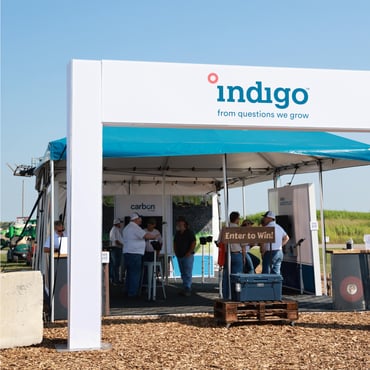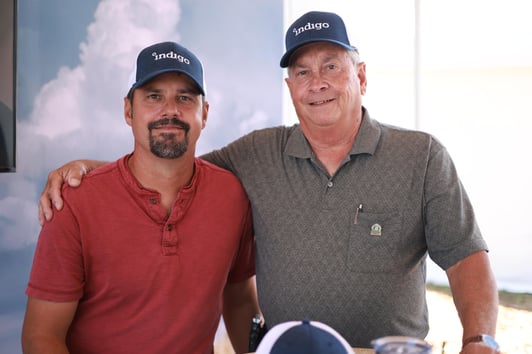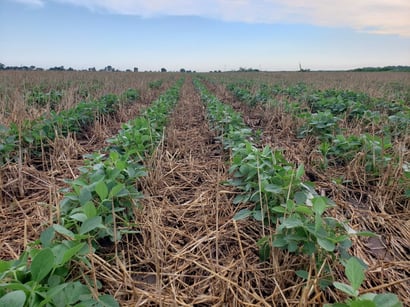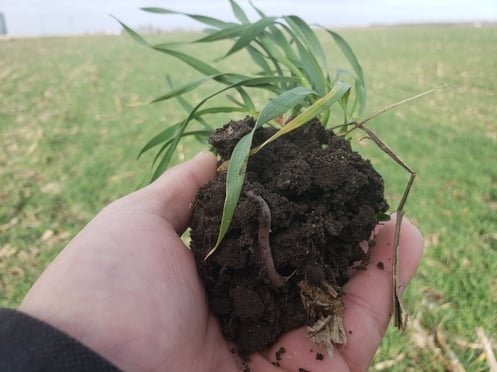Even though Ryan Heiniger hasn’t always been farming, he’s always stayed close to the management of land, its resources, and safeguarding the wildlife who inhabit it. The majority of the wildlife biologist’s career was spent with two upland and wetland conservation non-profits: Ducks Unlimited for the first fifteen years and Pheasants Forever for the next eight. In his former roles, Heiniger worked to demonstrate how profitable production agriculture and land conservation can occur simultaneously by utilizing the right land management practices that can improve soil health, wildlife habitats, and water quality, all while making the producer more money.
In 2013, when Heiniger’s father asked for his son to work on the Iowa family farm again, Ryan did so with new insight – a knowledge base for a more beneficial agriculture. It would serve the family well, keeping them willing and adaptable, especially after facing down a disastrous start to the 2019 growing season. Flooding in the Corn Belt led to record prevent plant that spring.
“Eventually, the soil dried up,” Ryan said. “It pushed us to experiment even further with different cover crops.”
Positive responses in both yield and reduced erosion with bigger and more diverse cover crop blends kept the Heiniger family “game to continue learning” from there. This year, the use of regenerative farming practices led the Heinigers to win Indigo’s Soil Health Challenge, a social media sweepstakes that called for photography submissions demonstrating soil health progress, and which included a trip to the Farm Progress Show in Decatur, Illinois. There, Ryan and his father Phil described their interest in soil health, what problems they’ve been able to address with new land management practices, and the unexpected upsides of putting soil health first.

Indigo's booth at the Farm Progress Show.
Could you introduce yourself, your farm name, and your location?
My name is Ryan Heiniger. Our farm is located in far southeast Iowa, near Burlington, in the floodplain of the Mississippi river. I am a fourth-generation farmer with my dad, Phil. And I’m raising my two kids, Matthew and Autumn, as the fifth-generation.
 Ryan and Phil Heiniger
Ryan and Phil Heiniger
When and why did you become interested in soil health?
I've personally had an interest for a number of years, but it was really the disastrous spring flooding of 2019 and the associated prevent plant acres that led us to look for solutions, once the soil did dry up. We started with a few fields in oats and one field in winter cereal rye. This marks the third year that we've been doing a variety of cover crops on our farm. It was really to address the soil erosion for the rest of the growing season since, of course, we didn't have corn or soybeans going out there. Some of those positive responses in the yield monitor the following year kept us in the game to continue to experiment and learn.
Were you trying to answer a particular question when you got into soil health?
Soil health of course is a buzz word that's pretty common these days. For us, it really was looking at soil erosion that would have happened in 2019 when we had prevent plant and barren fields, but increasingly it is looking at a couple of different objectives. One being better infiltration of our rain events that we do have, but also trying to keep the soil temperature a little bit cooler during that peak period in July and August when that crop needs the moisture.
 Photo courtesy of Ryan Heiniger.
Photo courtesy of Ryan Heiniger.
What other problems were you trying to fix with these practices?
We know that we can always do better raising the organic matter within our crop fields. So from the soil health, cover crop, and limited disturbance standpoint, we were certainly looking for a better solution.
As a kid, Ryan, what did you observe your dad doing to improve the soil on that farm?
That's an interesting question. It’s changed during our lifetimes. I remember spending a lot of hours sitting in the tractor as a kid watching the plow. And that practice thankfully has gone by the wayside and that plow is sitting in the tree line. And so, over the years and decades, more attention to runoff issues and erosion, using fewer tillage passes in the fall. I’ve seen it all in my lifetime.
Where did you learn what to do to improve your soil's health?
I'm trained as a wildlife biologist, and so paying particular attention to different conservation issues, trying to soak it up from different field days, workshops, universities, government agencies, and private sector activities. It's amazing the number of resources that are available online as well, being able to virtually attend field days. So, a lot of different resources are out there.
What is different about your soil now, and how about your farm in general?
I think for us, to be honest, it is still a little too early to document very dramatic changes in the soil. But, you know, we're paying attention to that and when we can monitor it to see again where that organic matter tests and results will take us over time.
 Soil at Ryan's Farm. Photo courtesy of Ryan Heiniger.
Soil at Ryan's Farm. Photo courtesy of Ryan Heiniger.
Are there any unexpected upsides? More time, more resilient, et cetera?
I would say, in my mind at least, the upside is just knowing that we're doing everything we can to keep as much of our topsoil there. Again for the fifth, sixth and generations beyond that, knowing that despite our farm being relatively flat, we do have wind erosion. With some of these torrential rainfall events, we do have water erosion. These improved soil health practices are doing everything possible to keep soil so that our future kids and grandkids are going to be profitable and prosperous in their operation.
What do you think about credit programs?
Carbon credit programs are exciting developments for our industry, because what we've wanted for years is new revenue sources. We want the public to pay a greater attention to where their food resource comes from, and if all this can link together combining climate issues with additional revenue, to me that's really a win-win situation.
What are the broad positive outcomes of focusing on soil health?
As far as the broad outcomes focusing on soil health, I think it's looking beyond what that plant is doing or even what that field is doing from just a production standpoint and digging deep, paying more attention to the soil and really what's below ground.
I know that's a little bit cliché, but kind of a different focus, a different metric. And being able to see these different aspects add up. Again, back to the bottom line to revenue sources, ultimately that can help us be more sustainable and more profitable.
What are you most hopeful about regarding the future of agriculture?
That's a stop and think question… Honestly, it’s watching my two kids grow up on the farm. My wife and I lived out of state for 15 years. We made a deliberate decision for our careers, our personal and family life to move back home to where I grew up so that there could be a continuation of that tradition. And seeing them start to take more of an active role and an interest in learning and seeing the farm operate through their eyes, to me it's something that gives me a lot of hope for the future of agriculture.
Who do you farm for?
For me I farm for my grandfather, who played of course a key role in getting the farm started. Thinking about his memory, his legacy and those childhood memories growing up on the farm.
What progress are you most excited about in agriculture and why?
That the environmental movement and conservation and taking care of the resource has grown significantly over these last few years for any number of reasons. I think in the past, maybe it was done for less than authentic reasons, but I think where we're at today in 2021, it is authentic, and it's resulting in meaningful change.
*Individual grower experiences may vary. You should independently consider the risks and benefits of the adoption of any agronomic practices on your farmland.




